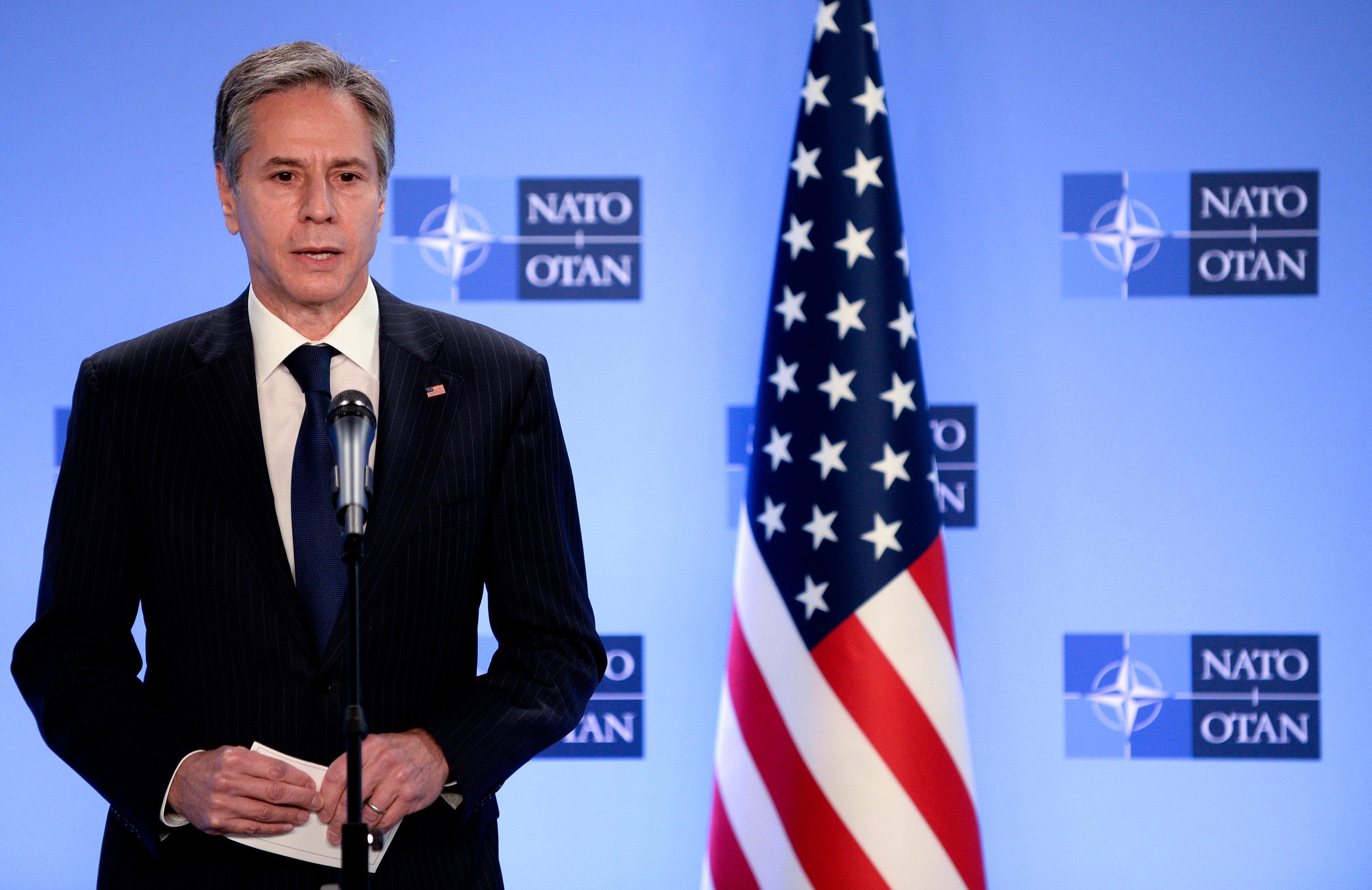Blinken, Austin to brief NATO on Afghan withdrawal plan
President Joe Biden's top national security aides are briefing NATO about U.S. plans to withdraw all troops from Afghanistan by the 20th anniversary of the Sept. 11 terrorist attacks

Your support helps us to tell the story
From reproductive rights to climate change to Big Tech, The Independent is on the ground when the story is developing. Whether it's investigating the financials of Elon Musk's pro-Trump PAC or producing our latest documentary, 'The A Word', which shines a light on the American women fighting for reproductive rights, we know how important it is to parse out the facts from the messaging.
At such a critical moment in US history, we need reporters on the ground. Your donation allows us to keep sending journalists to speak to both sides of the story.
The Independent is trusted by Americans across the entire political spectrum. And unlike many other quality news outlets, we choose not to lock Americans out of our reporting and analysis with paywalls. We believe quality journalism should be available to everyone, paid for by those who can afford it.
Your support makes all the difference.President Joe Biden’s top national security aides are briefing NATO about U.S. plans to withdraw all troops from Afghanistan by the 20th anniversary of the Sept. 11 terrorist attacks.
Secretary of State Antony Blinken and Defense Secretary Lloyd Austin will meet senior officials from the alliance’s 30 members on Wednesday to discuss how to coordinate the withdrawal of NATO forces in concert with the departure of the remaining American troops.
The coalition operation in Afghanistan has special resonance with NATO as its deployment marked the first time the alliance invoked its Article 5 mutual defense pact, which holds that an attack on one member is an attack on all. Biden is to formally announce his withdrawal plans later Wednesday in Washington, according to senior officials who previewed the move on Tuesday.
Blinken and NATO chief Jens Stoltenberg kicked off Wednesday’s meetings at NATO headquarters in Brussels by recalling the alliance’s success in driving Osama bin Laden’s al-Qaida network from Afghanistan. But Blinken also maintained the allies would not abandon the country despite the impending pullout.
“Together, we went into Afghanistan to deal with those who attacked us and to make sure that Afghanistan would not again become a haven for terrorists who might attack any of us,” Blinken said. “And together, we have achieved the goals that we we set out to achieve. And now it is time to bring our forces home.”
Blinken noted the mantra that has guided NATO's Resolute Support mission has been “in together, adapt together, and out together.”
“We will work very closely together in the weeks and months ahead on a safe, deliberate and coordinated withdrawal of our forces from Afghanistan,” he said.
Stoltenberg said that the meetings would be focused on "our future presence in Afghanistan” and that the alliance, which makes decisions on the basis of consensus, could be expected to make those plans known in the near future.
Even before the group meetings began, it appeared that consensus on withdrawal was at hand. German Defense Minister Annegret Kramp-Karrenbauer said NATO members were likely to decide to join the U.S. in pulling out their troops by Sept. 11.
“We have always said: We go in together, we go out together,” she told Germany’s ARD television. “I am in favor of an orderly withdrawal.”
Germany, which currently has some 1,000 troops in Afghanistan, has always said that it would no longer be able to maintain a presence there if the U.S. were to leave.
Biden’s decision to withdraw troops by fall defies a May 1 deadline for full withdrawal under a peace agreement the Trump administration reached with the Taliban last year, but it leaves no room for additional extensions. It sets a firm end to two decades of war that killed more than 2,200 U.S. troops, wounded 20,000 and cost as much as $1 trillion.
But America's withdrawal combined with the departure of NATO troops also risks many of the gains made in democracy, women’s rights and governance, while ensuring that the Taliban, who provided al-Qaida’s haven, remain strong and in control of large swaths of the country.
Blinken sought to address those concerns by saying that the withdrawal would not mean the end of America's or NATO's support for Afghanistan. “Even as we do that, our commitment to Afghanistan, to its future, will remain,” he said.
An administration official said Biden decided that the withdrawal deadline had to be absolute, rather than based on conditions on the ground. “We’re committing today to going to zero” U.S. forces by Sept. 11, and possibly well before, the official said, adding that Biden concluded that a conditioned withdrawal would be “a recipe for staying in Afghanistan forever.”
The president’s decision, however, risks retaliation by the Taliban on U.S. and Afghan forces, possibly escalating the 20-year war. Peace talks between the Afghan government and the Taliban are at a standstill but are expected to resume later this month in Turkey.
In a February 2020 agreement with the Trump administration, the Taliban agreed to halt attacks and hold peace talks with the Afghan government, in exchange for a U.S. commitment to a complete withdrawal by May 2021.
Over the past year, U.S. military commanders and defense officials have said that attacks on U.S. troops have largely paused but that Taliban attacks on the Afghans increased. Commanders have argued that the Taliban have failed to meet the conditions of the peace agreement by continuing attacks on the Afghans and failing to cut ties with al-Qaida and other extremist groups.